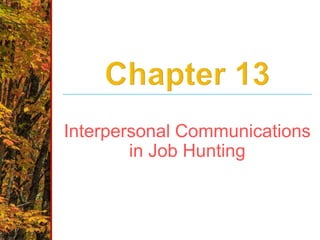
Chapter_Thirteen_KH.pptx
- 1. Interpersonal Communications in Job Hunting
- 2. Types of Interpersonal Communications in Job Hunting Information interviews Social Networking Job interviews Second interview or site visits
- 3. Information Interviews Way to obtain insider information Preparing for information interviews Researching career field, position or employer Develop questions Arranging/conducting information interviews Follow up/evaluation afterwards What questions are useful to ask after informatio n interviews?
- 4. Social Networking What can social networking do for you? Learn about jobs in hidden job market Make valuable contacts Knowledge about career fields/industries Improving networking skills Skill that can be learned & polished Join professional associations even as a student Get involved in alumni groups Use self & options knowledge to guide networking activities What profession al association groups could you network with?
- 5. Job Interview Preparation Know yourself—values, interests, key skills employers value Review sample questions— see Table 13.1 What value added might you bring to an organization? Which questions would you find challenging to answer?
- 6. Researching Employers Critical aspect of interviewing Name four important reasons to research employers prior to an interview See Table 13.2 for “Employer Facts to Know” How many of these facts would be important to you?
- 7. Practice Before the Interview Role play or participate in mock interview Review sample questions--know which ones might be challenging for you Avoid memorizing your answers Focus on question being asked
- 8. Appearance and Clothes First impressions are critical General guidelines: 2-piece dark-colored suit Conservative (except for some types of employers) Keep accessories to a minimum Be moderate in use of perfumes, fragrances, etc. Bring your materials in professional bag or portfolio
- 9. Appearance and Clothes (cont’d) Business casual—still important to have a tailored, clean look Do a “test run” with your outfit Cover tattoos/piercings unless compatible w/ organization’s culture Other important first impression points: Be on time! Know where you are going--account for travel & parking time Check appearance in restroom once you arrive
- 10. Initial Interview Actual interview structure may vary by type of employer/ organization Interviewer questions typically cover 4 areas: 1) Academic background 2) Experience 3) Strengths & weaknesses 4) Personal characteristics
- 11. Types of Interviews On-campus interviews Telephone interviews Video & Skype interviews Behavioral-based interviewing Performance & stress interviews Who has had experience with one or more of these types?
- 12. Answering Behavioral Questions Use the STAR technique (S)ituation (T)ask (A)ction (R)esult What was the situation? The task that needed to be done? What action did you take? What were the results? Who can share an example of this?
- 13. Stress Interviews and “Creative Questions” May involve a range of unusual questions Often no “right” answer Interviewer may be looking for How you react under pressure Creativity Resourcefulness Unclear how useful these questions are in finding the best candidates
- 14. Social/Emotional Competence What skills are associated with SEC? Connection to portfolio, social media profile, and core competencies valued by employer’s profile How can these be communicated in interviews? What are ways to improve your SEC?
- 15. Salary Do research on starting salaries for positions you seek Be prepared to share expected salary figure if asked and back up your request Can use a range See Chapter 14 for more information on negotiating salary
- 16. “Sticky” Interview Topics Illegal vs. inappropriate? What’s the difference? Examples: Are you a U.S. citizen? How old are you? What is your marital status? What social organizations do you belong to? Have you ever been arrested?
- 17. “Sticky” Interview Topics Consider interviewer’s motive Avoid becoming defensive/angry Three Options: 1) Answer the question 2) Refuse to answer the question 3) Examine question’s intent & respond accordingly What would you do in this type of situation?
- 18. Data Analytics/ One-Sided Interviews Use of robots for one-sided interviews Using personality tests & data analysis to match applicants with positions What are some tips for handling “one-sided interviews?” How does this impact interviewing & recruiting?
- 19. Your Turn to Ask Questions Result of thorough research Reflect a sincere interest in organization & position Provide a chance to explore your fit with the organization Were not answered by other sources What are some examples of questions that would be useful to ask?
- 20. Questions to Avoid in Initial Interview Salary Vacation time Benefits Why are questions about these topics problematic?
- 21. Closing Have awareness of interview length Thank interviewers and ask for their business card Check on next steps Re-emphasize your interest, appreciation for being considered Ask about following up to check on status of your application
- 22. After the Interview One of the most overlooked steps Importance of thank you notes after interviews Reaffirm interest Restate some of your qualifications Chance to gain additional information to use in decision- making
- 23. After the Interview Self-Evaluation: What points seemed to interest the employer? How well did I present my qualifications? Did I talk too much? too little? What questions were difficult for me? How can I improve for the next interview?
- 24. Second Interview & Site Visits Usually final step before receiving an offer Chance to view facilities, meet other employees, visit local community How well do you fit organizational culture? Structured vs. unstructured 2nd interviews How do they differ?
- 25. Preparing for Second Interview Getting schedule of activities in advance Know who will be involved in the process Importance of ongoing employer research Understand how expenses, travel, car rental will be handled Follow up with a thank you and submission of any materials related to reimbursement
- 26. CIP Perspective Self-Knowledge Importance of self-knowledge in networking & interviewing Option Knowledge Role of networking, social media, and interviews in learning about job option Decision Making Social interactions provide important information for all CASVE cycle phases Executive Processing Importance of positive metacognitions in context of job search social interactions